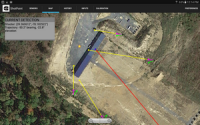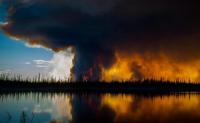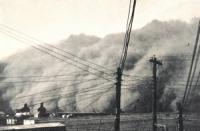-
2016 warmest year on record globally: NASA, NOAA
Earth’s 2016 surface temperatures were the warmest since modern recordkeeping began in 1880, according to independent analyses by NASA and NOAA. Globally-averaged temperatures in 2016 were 1.78 degrees Fahrenheit (0.99 degrees Celsius) warmer than the mid-twentieth century mean. This makes 2016 the third year in a row to set a new record for global average surface temperatures.
-
-
U.S. harvests to suffer from climate change
Some of the most important crops risk substantial damage from rising temperatures. To better assess how climate change caused by human greenhouse gas emissions will likely impact wheat, maize and soybean, an international team of scientists now ran an unprecedentedly comprehensive set of computer simulations of U.S. crop yields. The simulations were shown to reproduce the observed strong reduction in past crop yields induced by high temperatures, thereby confirming that they capture one main mechanism for future projections.
-
-
Sea levels in U.S. Northeast to rise faster than global average
Sea level in the Northeast and in some other U.S. regions will rise significantly faster than the global average, according to a report released by the National Oceanic and Atmospheric Administration (NOAA). Moreover, in a worst-case scenario, global sea level could rise by about 8 feet by 2100. “Currently, about six million Americans live within about six feet of the sea level, and they are potentially vulnerable to permanent flooding in this century. Well before that happens, though, many areas are already starting to flood more frequently,” says one expert. “Considering possible levels of sea-level rise and their consequences is crucial to risk management.”
-
-
Warming temperatures in Northeast U.S. decades ahead of global average
Temperatures across the northeastern United States will increase much faster than the global average, so that the 2-degrees Celsius warming target adopted in the recent Paris Agreement on climate change will be reached about twenty years earlier for this part of the U.S. compared to the world as a whole.
-
-
Changing climate caused giant Middle East dust storm, not human conflict
In August 2015, a dust storm blanketed large areas of seven Middle East nations in a haze of dust and sand thick enough to obscure them from satellite view. The storm led to several deaths, thousands of cases of respiratory ailments and injuries, and canceled airline flights and closed ports. At the time, the storm’s unusual severity was attributed to the ongoing civil war in Syria. Now, researchers who experienced the storm while in Lebanon, have found a more likely cause for the unprecedented storm — it was not human conflict, but a combination of climatic factors and unusual weather.
-
-
New framework needed for estimating the social cost of carbon: Report
To estimate the social cost of carbon dioxide for use in regulatory impact analyses, the federal government should use a new framework that would strengthen the scientific basis, provide greater transparency, and improve characterization of the uncertainties of the estimates, says a new report by the National Academies of Sciences. The report also identifies a number of near- and longer-term improvements that should be made for calculating the social cost of carbon.
-
-
Gunshot localization system improves emergency services response to active shooter events

Kathleen Griggs is president of Databuoy. Databuoy Corporation began in 2006 as a defense contracting company specializing in event-driven command and control operations. It has now realigned itself to focus on public safety in the private sector. Databuoy Corporation’s ShotPoint gunshot localization system is a technology aiming to improve the response of emergency services to an active shooter event. ShotPoint uses networked acoustic sensors that automatically detect, locate, and reports the exact time and location of the source of gunfire.
-
-
Changing rainfall patterns linked to water security in India
Changing rainfall is the key factor driving changes in groundwater storage in India, according to a new study. The study shows that changing monsoon patterns—which are tied to higher temperatures in the Indian Ocean—are an even greater driver of change in groundwater storage than the pumping of groundwater for agriculture.
-
-
Short-lived greenhouse gases cause centuries of sea-level rise
Even if there comes a day when the world completely stops emitting greenhouse gases into the atmosphere, coastal regions and island nations will continue to experience rising sea levels for centuries afterward, according to a new study. Researchers report that warming from short-lived compounds — greenhouse gases such as methane, chlorofluorocarbons, or hydrofluorocarbons, that linger in the atmosphere for just a year to a few decades — can cause sea levels to rise for hundreds of years after the pollutants have been cleared from the atmosphere.
-
-
More frequent large-scale tornado outbreaks
The frequency of large-scale tornado outbreaks is increasing in the United States, particularly when it comes to the most extreme events, according to new research. The researchers found that the increase in tornado outbreaks does not appear to be the result of a warming climate as earlier models suggested. Instead, their findings tie the growth in frequency to trends in the vertical wind shear found in certain supercells—a change not so far associated with a warmer climate.
-
-
Flood risks changing across U.S.
The risk of flooding in the United States is changing regionally, and the reasons could be shifting rainfall patterns and the amount of water in the ground. Engineers determined that, in general, the threat of flooding is growing in the northern half of the U.S. and declining in the southern half. The American Southwest and West, meanwhile, are experiencing decreasing flood risk.
-
-
Assessing climate resiliency of more than 250 U.S. cities
The University of Notre Dame’s Global Adaptation Initiative (ND-GAIN) has announced it will assess the climate vulnerability and readiness of every U.S. city with a population over 100,000 — more than 250 in all — in an effort to help inform decisions by city officials on infrastructure, land use, water resources management, transportation and other adaptive strategies. The Urban Adaptation Assessment (UAA) will also integrate a social equity analysis, which will investigate how vulnerable groups are disproportionately harmed by climate hazards, such as extreme heat, flooding and extreme cold.
-
-
Groundwater resources around the world could be depleted by 2050s
Human consumption could deplete groundwater in parts of India, southern Europe, and the United States in the coming decades, according to new research presented at the 2016 American Geophysical Union Fall Meeting. New modeling of the world’s groundwater levels finds aquifers — the soil or porous rocks that hold groundwater — in the Upper Ganges Basin area of India, southern Spain, and Italy could be depleted between 2040 and 2060.
-
-
The origins of Tennessee’s recent wildfires

Wildfires raged recently through the foothills of Tennessee’s Great Smoky Mountains, fueled by severe drought and high winds in the eastern part of the state. The fires damaged or destroyed more than 1,400 structures, including homes, chapels, and resort cabins. Fourteen people were killed, and nearly 150 others were injured. Last week, two juveniles were taken into custody and charged with aggravated arson in connection with the deadly wildfires – but sources such as Climate Central suggested that rising temperatures may have played a role in the fires. Does climate change play a role in determining the frequency and intensity of wildfires?
-
-
Dust Bowl would devastate today’s crops: Study

A drought on the scale of the legendary Dust Bowl crisis of the 1930s would have similarly destructive effects on U.S. agriculture today, despite technological and agricultural advances, a new study finds. Additionally, warming temperatures could lead to crop losses at the scale of the Dust Bowl, even in normal precipitation years by the mid-twenty first century.
-
- All
- Regional
- Water
- Biometrics
- Borders/Immig
- Business
- Cybersecurity
- Detection
- Disasters
- Government
- Infrastructure
- International
- Public health
- Public Safety
- Communication interoperabillity
- Emergency services
- Emergency medical services
- Fire
- First response
- IEDs
- Law Enforcement
- Law Enforcement Technology
- Military technology
- Nonlethal weapons
- Nuclear weapons
- Personal protection equipment
- Police
- Notification /alert systems
- Situational awareness
- Weapons systems
- Sci-Tech
- Sector Reports
- Surveillance
- Transportation
Advertising & Marketing: advertise@newswirepubs.com
Editorial: editor@newswirepubs.com
General: info@newswirepubs.com
2010-2011 © News Wire Publications, LLC News Wire Publications, LLC
220 Old Country Road | Suite 200 | Mineola | New York | 11501
Permissions and Policies
Editorial: editor@newswirepubs.com
General: info@newswirepubs.com
2010-2011 © News Wire Publications, LLC News Wire Publications, LLC
220 Old Country Road | Suite 200 | Mineola | New York | 11501
Permissions and Policies
